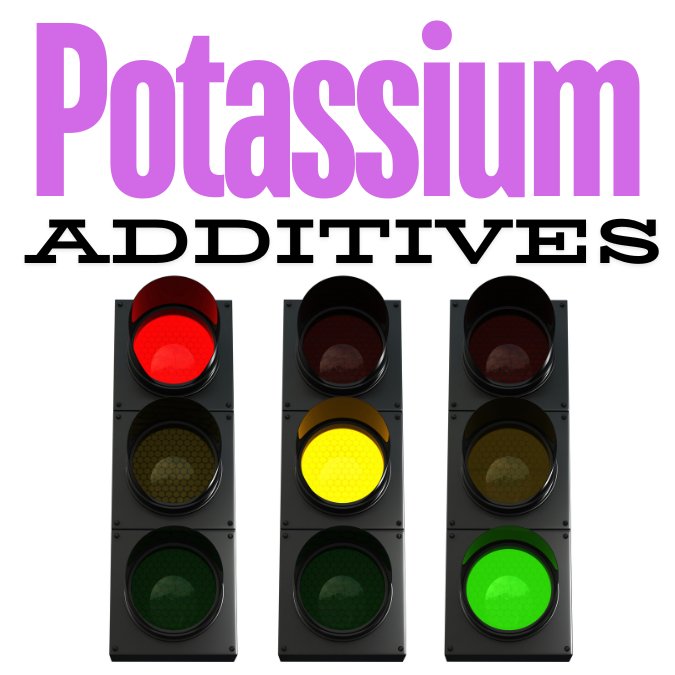I recently had a paper accepted in the Journal of Renal Nutrition! The paper is: Potassium Food Additives and Dietary Management of Serum Potassium: Proposed Best-Practice Recommendations.
I wrote this paper with a colleague from the UK. Our hopes were to ensure the paper can help both the North American and European audience.
Though, most importantly, we wrote this paper for clinicians. We wanted to provide as much as clarity as possible around what to tell patients about potassium additives. So today’s post is a quick synopsis and backgrounder on our paper.
What we did?
A rapid literature reviews for each of the most common potassium additives. We determined which additives were the most common using my previous paper. Then, we summarized the literature trying to answer the question:
Is this potassium additive one that my patient’s need to worry about?
What did we find?
Most importantly, based on what we know at this point, it doesn’t appear that every additive that contains potassium will be one your patient’s need to worry about. Why not?
Not all potassium additives cause big increases in potassium because they are added in only small amounts.
However, some additives do! So we need to ensure we help are patients find the ones that matter and forget about the ones that don’t.
Why this article matters?
For me, the most important part about this work was trying to figure out which additives don’t matter. I don’t want to restrict foods that people can safely consumed. I do NOT want to make diets any more restrictive then they need to be. And as we embrace these new practice recommendations around potassium, moving to focus on processed foods, I want to ensure we avoid repeating our old mistakes and restricting foods that could be safe.
Disclaimer Alert!!
One thing though that is painfully obvious when we did the literature review, is the LACK of information available about potassium additives. The disclaimer is that this paper summarizes only what we know now.
And that will likely change. In part related to changes in food industry practices and changes in general in knowledge base as interest in potassium additives continues to grow.
What additives do my patient’s need to worry about?
Here is the list of additives that patient’s may need to watch out for if they have hyperkalemia. These additives are highly bioavailable and often increase the potassium content of foods.
- Potassium phosphates
- Potassium chloride
- Potassium citrate
- Potassium lactate
- Potassium sulfite, sulfate, metabisulfate and bisulfite
What additives do my patient’s not need to worry about?
At this point, based on estimates of use, these additives do not appear to be a concern for those with hyperkalemia.
- Acesulfame potassium
- Potassium sorbate (unless it’s in their bread – more about that here)
- Potassium benzoate
- Potassium Iodide, iodine and iodate
- Potassium carbonate and bicarbonate
Just going to give the disclaimer again – this list of not to worry about additives could change.
What additives might we watch out for in the future?
I am watching the literature base for more information about potassium sorbate and carbonates.
Potassium sorbate is added to many foods. This makes we worry about the potential for it to add up in the diet.
I will also follow the literature on potassium carbonate, which is currently being tested as a sodium substitute. When potassium additives are used as a sodium substitute, they tend to add a significant amount of potassium.
What additives are unlikely to change
My guess is that neither acesulfame potassium or potassium iodides will be problematic. Acesulfame potassium as a sugar substitute only has so many uses and just adds a very small amount of potassium. It is also an “old” potassium additive, in that it has been around for quite some time.
Potassium iodide is restricted due to its iodine content, and since humans only need small amounts of iodine, I don’t think it will be a concern in the future.
Take Aways
If you are doing a potassium teach and you are getting to the level of reading ingredient’s lists for potassium, ensure you provide patients with some guidance on which potassium additives to watch out for. If you aren’t specific they may end of restricting more foods than is really necessary.
| Potassium Additives to Watch Out For | Potassium Additives that are OK |
| Potassium Chloride | Acesulfame potassium |
| Potassium Phosphates | Potassium Iodide, Iodine or Iodate |
| Potassium Citrate | Potassium benzoate |
| Potassium Lactate | Potassium carbonate or bicarbonate |
| Potassium sulfate, sulfite, metabisulfate or bisulfate | Potassium Sorbate (unless eating alot of bread products containing it) |



This is very helpful. Thank you!